Text
In my recent essay for Platypus: the CASTAC Blog I reflect on how #socialmedia users around the world collectively demonstrate their support for #Palestine through their interactions with #food through #digital #gastrosolidarity. Simply, how do you digest political dynamics and guard your beliefs and ideologies with your gut?
I expand upon my earlier reflections on digital #gastrodiplomacy, touch upon banal #nationalism, and expand upon typologies of how people express and engage with surrounding politics through their food choices, preparation, and consumption. I do so by presenting and examining different accounts and projects on #facebook #instagram and #tiktok, where creators and users voice their unapologetic support of Palestine in their food-centered content in different ways.
I position and distinguish this gastrosolidarity concept by drawing from Low (2020)'s conception of #gastopolitics and Schneider et al. (2018) ruminations on #digitalfoodactivism.
Within this piece, I do not claim to define nor lead discussions on what Palestinian foodways and cuisine are, nor do I attempt to simplify and flatten the range of which activism in solidarity for Palestine manifests. If anything, this is a mosaic of how the Palestinian diaspora and their supporters co-create, share, and perform acts of solidarity for Palestine through seemingly everyday mundanities like food, cooking, and eating.
0 notes
Text

Portugal in summertime
1 note
·
View note
Text
A Safe Place
TW/CW: Transphobia, Racism
As a child, my favourite book series was Lemony Snicket's "A Series of Unfortunate Events." Across 13 books and a small collection of extra material, including a pseudo autobiography, Lemony Snicket (or Daniel Handler) detailed the struggles and triumphs of three, hyper-intelligent, orphans, trying to navigate a wicked world. As they end up in rather compromising situations, the children hold onto the hope that they will find, as Handler writes, "the last safe place".
This so called "safe place" was collectively imagined by the children as a santuary nestled away in nature, away from all the injustice and morally corrupt people they've been encountering. There, they would be at peace and protected. However, as they reach this location, they realise by ignoring the treacheries of the world, they would be also trapped. They would be forced to passify their interest in bettering th world and to accept falsehoods as fact. In the end, they acknowledge that nothing can be simply packed into neat boxes -- things are more complex than they appear is the take away.
For a series I started reading in elementary school, and occasional revisit as an adult, I now recognise that these were some intense themes I was dealing with. I bring them up now, because I find myself accidentally in a similar idealistic thought bubble when it comes to "safety". To some extent, like Violet, Klaus, and Sunny -- I flattened the realities of the world we're living in into binaries of "safe" and "not safe". And in doing so, I left myself in quite a vulnerable position and I suppose this essay is how I am processing it.
It's been almost 8 years since I've come out as non-binary. It happened in a quite cliche way as I often joke -- with a mental breakdown and shaving all my hair off during my year abroad. With a buzzcut, I struggled a lot with my image and understanding of self. I realised I hid a lot of my frustrations and confusions about performing womanhood, woman-ness, and everything in between behind my long hair.
Growing up, both my parents were very militant in this way about femininity. My mother's insights felt more like a typical assertion of either my sister or I being in her image. I also think, as I grow older, it had a lot to do with her experience under the Khmer Rouge regime where they cut all her hair cut as an attempt of standardisation under communism plus a detterent for lice. Either way, long hair, specifically on me, meant a lot to my mother.
On the otherhand, it meant a lot to my father as well -- though in a more annoyingly patriarchal sense. Some gems he said to me a sa child, which now I realise were a part of my gender unraveling of sorts, include: "You're a girl, you need to have pretty long hair." "You're a princess, you can't be anything else." "You can't skate because you'll mess up your legs and men won't like that." What a guy.
One of my cousins was equally as culpable in my gender-unraveling. She used to bully me, my sister, and my other cousin using nicknames meant to harm us. She used to call me "boy" because she felt that I wasn't "girl" enough. Simplistic, enough. Straight to the point. I was definitively not-girl.
Regardless, and expectedly, I resented all of that. It took me 12 years of being out of the closet (knew I was a little fruity at 10 years old, but who wouldn't be after doing so much theatre and being around so many virbrant human beings?) and a handful of gender studies courses to realise I was, well, a bit different. I had my "moment". I shaved off all my hair, focused on performing adrogyny, and updated all my social media account bits where you could add pronouns. I had a very underwhelming conversation with my family members, who still occasionally misgender me to this day. I embraced my perpetual struggle with gender quite openly.
Throughout my graduate studies, I met many wonderful queer people who nourished and celebrated the essence of me that I was still figuring it out. I am grateful for that. However, this journey was not without issues. Upon moving to Italy I faced an impossible struggle with a gendered language and way of life. I found solice in queer-coded spaces like roller derby and rollerskating. Somewhere along that assimilation into my "Italian" layer of myself, I stopped being andrognyous. I stopped thinking that I had to care, because people were already getting EVERYTHING wrong about me because I wasn't fluent in Italian. My appearance of being brown and a migrant (who sucked at Italian) superceded my priority to be acknowledged and identified by my queerness. It was just another confusing layer for most people who weren't that close to me anyway.
It's not to say I have no friends in Italy, because that is factually untrue. It is simply to say that I acknowledge that in the midst of my actual combatative moments of racism, ableism, and arguable emotional trauma from certain authority figures, that I was not experiencing myself, and therefore my gender, in full. I was a shell of a person. I often reflect on this in relation to my romantic break-up with my ex. I think "Well do I blame him? I was a shell of a person during my PhD so why would I want to stay together while he turns into a shell?" Perhaps that just something I tell myself to sleep at night, but to be clear: I am very happy and I wish him all the best in his personal journey.
Anyways, when I received my first academic position, I decided I was going to re-assert my claim towards my gender. I openly explained I was non-binary, to everyone. I was not going to be supressed by the social structures around me, and quite frankly I think the Netherlands was quite supportive of that (or so I thought). In my eyes, I was reclaiming control of myself, after years of well, not being myself.
So far so good I thought. Nothing egregious happened. Somehow I was expecting people to be very actively transphobic, I mean transphobes are EVERYWHERE. What transpired next, is a bit more slow burn, and harmful in its own minute ways.
In class and to my peers I always emphasise that I don't "keep score" for misgendering. I don't. However what I curiously noticed is that by being open about being non-binary, there was a shift in "carefulness" and emotional labour. More times than not, I ended up consoling people for misgendering me, despite me being very open that it was a joint learning process. I had more people looking at me for validation that I personally judged them to not be a shitty person. I had to tiptoe around conversations about LGBTQ+ and "gender stuff" because everyone's eyes were bulging in my direction whenever it came up. In some way, it felt like they were trying to gauge "how far" I am on the radical-queer-human-political-spectrum. Um yeah, okay, we're all a monolith I guess.
As a lecturer it's very public-facing and intimate. My whole job is being on display for students to stare at, contest, and pick at. I am the first point of contact when they're pissed at course work, methods, or anything relating to their learning. I'm not afraid of this -- of course. As a performer in cabaret, drag, and an avid science communicator. I'm used to being in the spotlight. Also, as someone who has fought very ruthlessly to escape my marginalising contexts, I'm used to it. However, this does not mean I'm fully equipped to handle every situation nor be capable of enduring long spans of pain and suffering.
And yet here we are. I have recently come to face with situations which have caused me to critically reflect on, and genuinely feel pain about the dual responsibility that comes with being out, and open, as "the queer lecturer". Much of the criticism from the "far right" (whatever that could mean) is that we're in an age where "everyone is queer". This always makes me laugh, naturally. We have always existed. LBGTQ+ people have always existed! We were just actively ignored, oppressed, and murdered throughout history. Do you know how terrible that is? Imagine having the capacity to just acknowledge that you have the opportunity to exist without thread of being senselessly harmed, outright murdered, or a focal point of distress and shame for loved ones. Imagine being able to just be, without having your guard up. Imagine. Imagine the toll this has on LGBTQ+ people every second. I'm not here to fetishise my own sadness nor other LGBTQ+ people. I'm just here to ruminate a bit on the weight which many of us, carry internally.
I feel that one of my responsibilities is to be an example to my students, but also a resource for those who relate to me and my identities. I am a safe place for people like me. That's so much work isn't it? Not only am I bound to be a good educator, I'm also entangled in the micro-politics of being a "good" person to so many kinds of people. I'm a "box-checker" for crying out loud. I'm first generation American and university student. I'm brown. I'm queer. I'm disabled. I'm an immigrant. I'm from a working class background. My parents are refugees. I'm probably some sick "progressives" wet dream. These are the pains I carry, histories which shape the very foundation with how I see, engage with, and experience the world. It's so much.
It's impossible to please everyone. I know that. I'm sure everyone knows that to some degree. But all I wish, genuinely, as I lay here very sick with the weight of the stress I am feeling on my entire being that I could stop apologising to everyone for being human. Even when I am physically sick from stress and pressure, it is impossible for me to tear myself away from "work". This just links back to my reflections on burning out doesn't it. Have I begun to burn out again? Is this the initiation of another unraveling? The GENDER edition?
I'm not sure. I hope not. Because I learned nothing before, so what can I learn this go around? Pedro in his attempts to console me these last few days remarked "I'm sure you'll learn something at the end of this." Will I? Will I learn to be "stronger" perhaps? Why must I be hard when I am so effortlessly soft? I enjoy my tenderness within the world, it allows me make such meaningful connections with ideas, people, and things.
In this moment of concern I wanted to shave my hair again. My mom always told me that in Khmer culture, we shave our heads when there has been a great pain. People often do it as a part of funeral rites, for close family members. I watched my aunts, uncles, and cousins shave their heads when my grandpa passed away. When my mom went through a fissure in her relationship with a sibling, she shaved her head. It is how I guess, "my people" and I mourn and grieve. If I shave my head, will people stop misgendering me? If I shave my head will my students see me as a "stronger" resource or "safe place"? These are some of the thoughts that rattled my brain. I haven't cut my hair yet, but I'm still thinking about it.
0 notes
Text
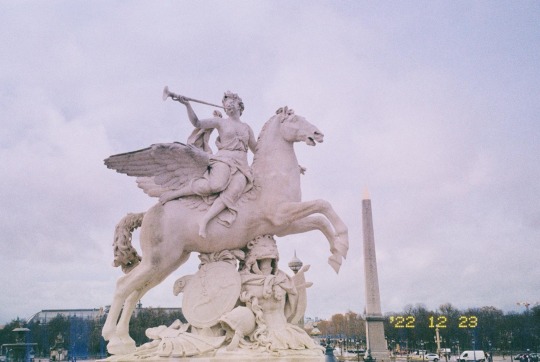
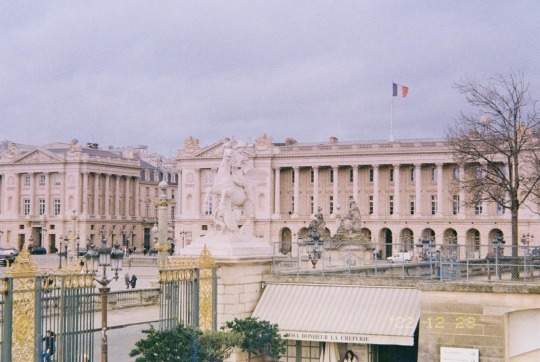
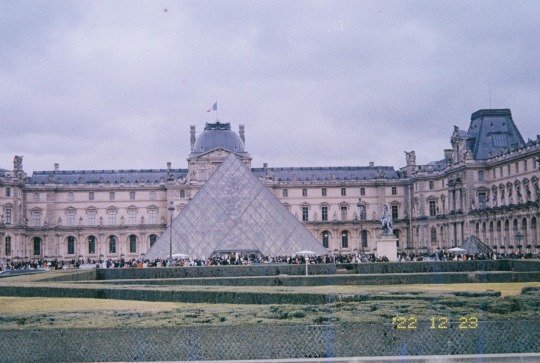
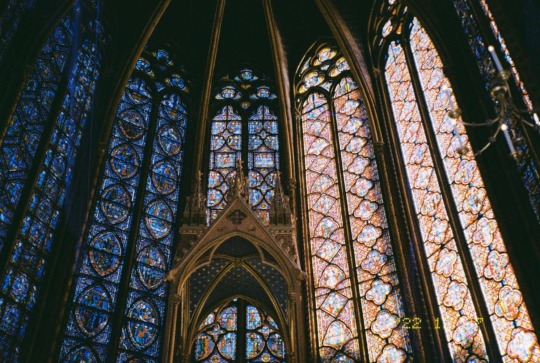

Paris (2022)
1 note
·
View note
Text
Everything I've Learned About Burning Out
I've spent a lot of time thinking about how I would word this piece. The difficulty with burnout is when you are indeed burnt out, you can't even process merely existing very well. Sleeping is hard. Eating is hard. Coping is exceptionally harder. Grief is not only debilitating, it's destabilising to the point of you're wondering why you're even alive in the first place.
I fathomed making jokes throughout this, simply to mirror my slow "return" to the world of the living, thinking, and mildly-fuctioning. I joke as a coping mechanism. It's been my "thing" my whole life. Entire generations of comedians make their careers off their trauma. And well, I don't plan to dedicate too many jokes to this written wallow about capitalism, academic careers, and common milestones of being a person in today's society. I just wanted to say, that when I was, very thoroughly burning out, I had no clue it was happening...and I think that's very funny.
It was like a true separation from reality. People were concerned for me, had entire conversations and very direct interventions with me. And I simply refused to acknowledge it in actuality. I would say "No I'm fine" and ignore a lot of the distressful nights of crying myself to sleep if I was lucky to sleep at all. I simply refused to do anything about my burnout aside from complain, and that wasn't even helping either.
I would vent to friends, family, colleagues. I had tea with a fellow colleague who was also suffering from the effects of burnout, and I simply just did not connect the dots. I would cry to Pedro, my partner, who is honestly always too kind and wonderful about everything, and lament about being "broken" to which he would reply "I know, it's not you. There's nothing wrong with you" almost every time.
I only realised I was burning out when I had an in-person meeting with a colleague to discuss how I was feeling about work, and I cried. I UGLY cried. It starts how most ugly crying starts -- suddenly and with exceptional surprise. In responding to a string of standard questioning, I just started to cry...and I didn't stop.
I cried about how little progress I felt I made as an academic. How little progress I made on writing all the things I wanted to write, because I was too busy and mentally exhausted from teaching. How I felt that this was my life now. A series of deadlines that would never be met and unfulfilled writing and grant obligations, despite all the intense efforts I felt like I was making daily. I was done. I was BEYOND depressed -- I was decimated. I wasn't me anymore.
This had a radical, but much needed reaction on my colleague’s end. We worked together to formulate a plan for me to get better, which involved a "break" from teaching. Honestly, I was very embarrassed. Not only did I sob in their office, here I was causing so much "trouble" for the planned teaching side of things. This was not the perspective of my colleague, but my own negative internal monologue.
So I concluded the rest of my summer and much of my autumn months with this teaching "break". During this break, I realised how much physical and emotional anguish I was in as the result of my work and career induced stress. Whenever I would look at my deadlines, I would develop actual acute chest pains for several days. I had problems eating, sleeping, and relaxing. The smallest noise or even too much sunlight would overwhelm me. No amount of my favourite activities would bring me joy. No amount of rollerskating, reading, or crafting could save me.
It's weird to reflect on this because here I was, given the space to "heal" and I was just feeling all the pains I've been ignoring for several years. The only comparison I can make right now is the pain one feels when adrenaline wears off. The damage from over-working for several years was extensive, and I felt every tear and cavernous wound.
I went to several doctors, all of which agreed I was burnt out and needed help. They gave me medications, they suggested therapies, they suggested less work. So I took the work reductions, all while feeling defeated about it. I stayed home, I avoided people, I tried to "get better". I took weird mixtures of plant extracts that my GP prescribed be because she didn't feel confident enough to prescribe me "something stronger" without the input of a psychiatrist which I wasn't allowed to see because of a 8+ month waiting list. I tried to get more extensive therapy, but then the actual treatment centre rejected me as patient because I "worked too much." Ironic, isn't it?
I was horrendously horizontal the entire time and had been for days, devastated with how horrible this whole experience was. I spent so much of my life thinking that if I had money, time, and support for "getting help" I would get it. I was wrong. I don't know why this suprised me so much, considering I work and teach about health access and inequities quite often.
I remember writing Stanley an email, shaking, laptop in my bed. He trained me, he has been deeply involved in my growth over the years. I would argue he "made me" who I am today, but knowing him, he wouldn't take that much credit. I told him that I was burnt out and I didn't know what to do. He responded that we should call and have a virtual tea together "just to talk, not work." He told me that everything would be okay, and that I needed to take care of myself. He told me that whatever gift I thought I had lost with burning out is still there inside me, and that I needed to nuture the "Thao things". I needed to make space for what made me, me.
So in efforts to love writing, researching, and crafting again, I shut my brain off. I distanced myself from everything that didn't matter to me at the time. I stopped talking to people, I didn't start anything new, I just focused on things that I needed to complete that mattered to me. I partially let go of my shame about "being late" for deadlines, because I had really spent months on what I feel, in hindsight, was being a member of the walking dead. I wasn't Thao anymore, so how could I do Thao-things?
I wrote and completed things that were mine. Mine as in that people had given me space to share my research, ideas, and work. I felt very horrible for being late, but it was "over". I realised that nothing could be perfect, but they could be "just enough" and someone else would make it better and I trusted them to do so.
I started collaging and drawing things again, being sure to keep all the shit drafts and lines attached in efforts to remind myself of the phrase and practice I hate a lot: "Respect the process."
I skated even though I didn't want to. I had no expectations about my progress or comparing myself to my skate team mates. I spent a few days in Barcelona with them so grateful to be alive and still skating, and I remembered so wholeheartedly why I do it in the first place...because it's fun! Same happened with Roller Derby, I just let myself be hit, coached, and focused on having fun. My anxiety drastically went down as a result.
I cooked complicated things when I felt like it, all from scratch. I tried new recipes and weird combinations. I also ordered takeout just because, a practice I never got used to post-Italy. I ate shitty food, because why not? I can't be bothered to cook or clean tonight, and that's fine.
I jumped back into teaching in early November, and I remember being terrified. As the weeks went on, I realised that I knew more than I recalled knowing...then again, it was the second year of me teaching this course. In that rest period, my brain had begun to slowly crawl up from that labrythine pit it was in. It wasn't much, but it was something.
Now as the term ends, I still think I'm burnt out. The truth is, I don't think I've learned much about it nor how to prevent it. All I got was a very strong reminder that even when you're burned out, and everyone is telling you that you need help, that the best case scenario is a short teaching break, you probably won't feel better.
I don't mean to be bleak, but that's the truth. I think I did everything "right" and yet, I was not healed. I'm still feeling bad, just less bad. Pedro's words have become more apparent. If the problem isn't me, it must be where I am. This inevitably leads to larger questionings of my institution, but also the grander scheme of academia.
It's no secret that academia runs on exploited labour, precarity, and questionable donations. Though I cannot pinpoint any one incident during my experience of working thus far as being a trigger to my spiral of burnout I will acknowledge one thing: the world does not end by moving a work deadline.
0 notes
Text

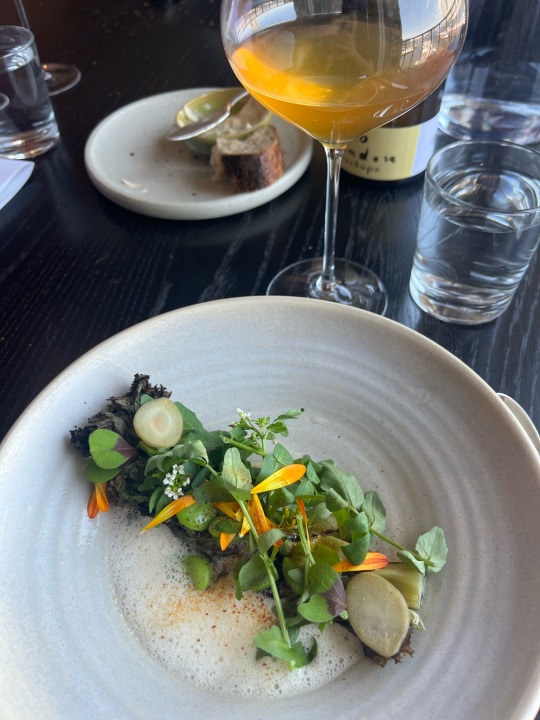
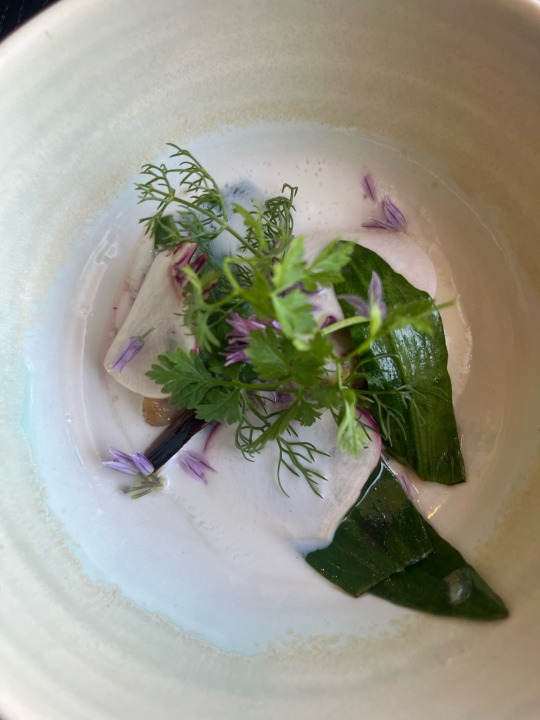

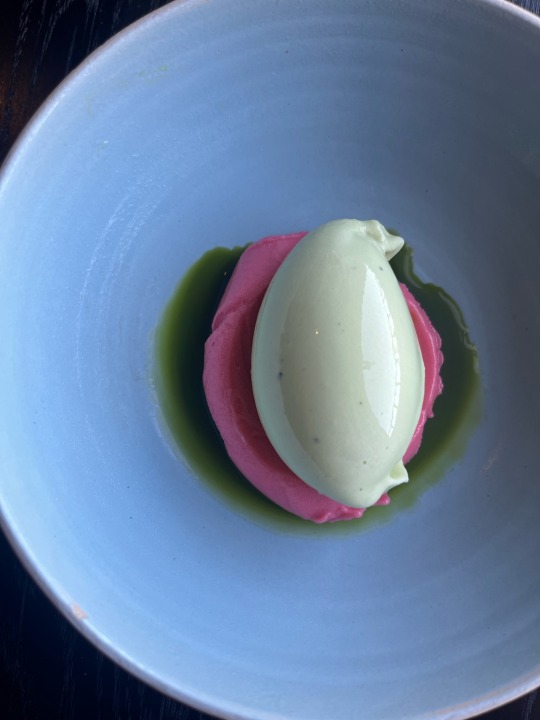

bak (amsterdam)
bits from their june 2023 7-course set menu
12 notes
·
View notes
Text
This week on Platypus, I wrote a short piece on how the #food in #videogames provides players with a means to learn about and experiment with them! I bring in insights about these fantasy #digitalfoods through brief autoethnographic reflections and conversations with fellow #gamers on #Twitter to highlight how videogames allow us to "play" with the blurring boundaries of realities of food both online and offline.
#food#digital food#video games#media studies#digital anthropology#gamer#animal crossing#legend of zelda#the elder scrolls#pokemon#cooking mama#maplestory#science and technology#STS
0 notes
Text


Foraged lots of Allium ursinum the other day :)
2 notes
·
View notes
Link
I wrote a short piece on the intersections of #Khmerican identity, #digitalfood, and #gastrodiplomacy for Platypus (the science and technology studies focused blog of the American Anthropological Association) this week!
I reflect on how #digitalgastrodiplomacy presents several opportunities for sharing and learning about collectively understood features of so-called "national foods" among nationals and members of the diaspora through digital food spaces (DFS).
1 note
·
View note
Text
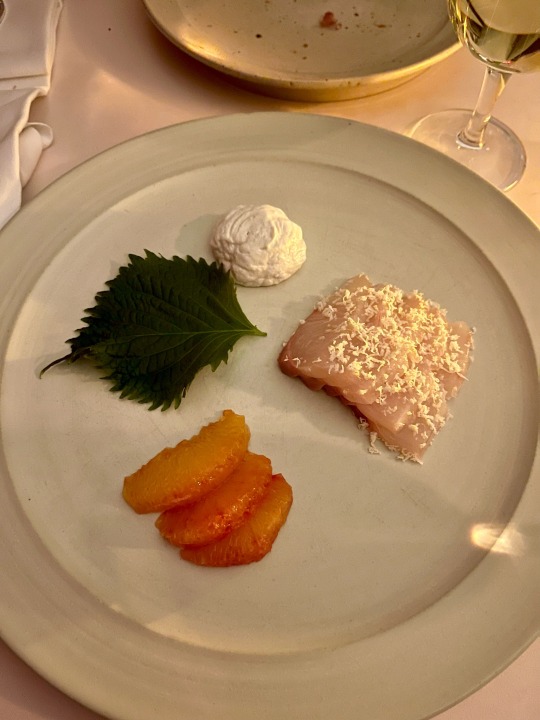

bambino (amsterdam)
left: hamachi sashimi x blood oranges x shiso x oyster cream
right: potato terrine x pollock x dashi foam
0 notes
Photo

Aglaonema Lotus Delight
#Aglaonema Lotus Delight#plants#thao art#botany#illustration#botanical illustration#botanical art#plant art
4 notes
·
View notes
Photo

Pink princess philodendrons
#pink princess philodendron#philodendron#plants#thao art#plant art#botany#botanical illustration#botanical art#illustrations
11 notes
·
View notes
Photo
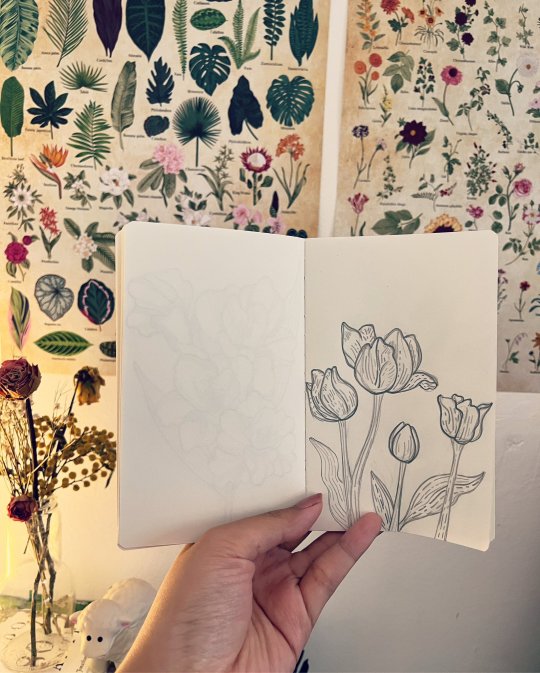
Some tulips from May that I forgot to post — seems MORE appropriate now that I’m living in the Netherlands — divination doodles haha.
11 notes
·
View notes
Photo

Gladiolus
#gladiolus#plants#flowers#illustration#botany#botanical art#botanical illustration#plant drawing#plant illustration#thao art
8 notes
·
View notes
Photo
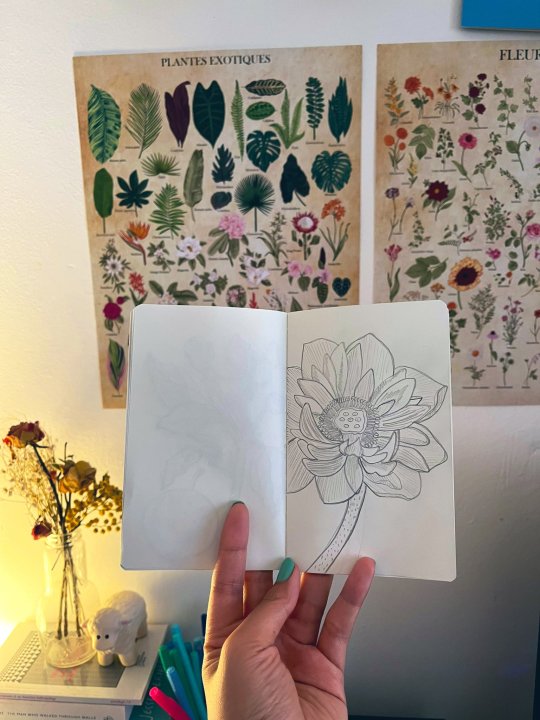
A cursed Nelumbo Nucifera for all my other Asian babes who have simultaneously seen too many and yet not enough of these in our life time? I too, prospered in mud...
12 notes
·
View notes
Photo

Malus
1 note
·
View note
Photo

Musa x paradisiaca attempt
1 note
·
View note